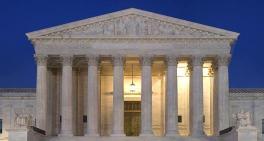Supreme Court blocks some redrawn North Carolina districts
Court Watch
The U.S. Supreme Court told North Carolina officials late Tuesday they must use some but not all of the state's legislative districts that other federal judges redrew for this year's elections.
The justices partially granted the request of Republican lawmakers who contend the House and Senate maps they voted for last summer were legal and didn't need to be altered.
A three-judge panel determined those GOP-approved boundaries contained racial bias left over from maps originally approved in 2011 and violated the state constitution. So the lower-court judges hired a special master who changed about two dozen districts in all. The judges approved them last month.
The Supreme Court's order means more than half of those districts redrawn by Stanford University law professor Nathaniel Persily will revert to their shapes from last summer. The order said House district changes made in the counties that include Charlotte and Raleigh because of state constitutional concerns are blocked while the full case is appealed, but changes made elsewhere to alleviate racial bias must be used.
The maps containing the partial changes will be used when candidate filing for all 170 General Assembly seats begins next Monday.
Boundaries approved by the General Assembly last August kept Republicans in a position to retain veto-proof majorities in the chambers, which has helped them advance their conservative-leaning agenda this decade. But Democrats are bolstered after successful elections in other states last year. Tuesday's ruling means Democrats could find it harder to win more House districts than they hoped.
Dozens of North Carolina voters originally were successful in overturning the 2011 districts as racial gerrymanders. They subsequently asked Chief Justice John Roberts, who receives appeals from the state, to allow the lower court's directive and require the changes approved by the three judges be used.
The Republicans' request was considered by the entire court and the order reflected division among the justices. Justices Clarence Thomas and Samuel Alito would have agreed to block all of the changes to the maps approved by the lower-court panel. Yet Justices Ruth Bader Ginsburg and Sonia Sotomayor would have denied the GOP's request entirely, according to the order.
Related listings
-
Top Pakistani court orders arrest of escaped police officer
Court Watch 01/28/2018Pakistan's Supreme Court gave police three days to arrest an absconding officer who is involved in killing an aspiring model in a 'fake shootout', a lawyer said Saturday.Attorney Nazeer Mehsud says suspended police officer Rao Anwar did not appear at...
-
Warrant dropped for professor who spoke Hawaiian in court
Court Watch 01/26/2018A judge dropped an arrest warrant Thursday for a University of Hawaii professor who refused to respond in court to English and spoke Hawaiian instead.Samuel Kaleikoa Kaeo was in court Wednesday facing a trial for charges connected to his participatio...
-
Analysis: Outside groups may factor in Arkansas court race
Court Watch 01/23/2018Arkansas Supreme Court Justice Courtney Goodson lost her bid to run the state's highest court two years ago after coming under fire from conservative groups that spent big on mailers and TV ads targeting her. Two years earlier, David Sterling was def...




